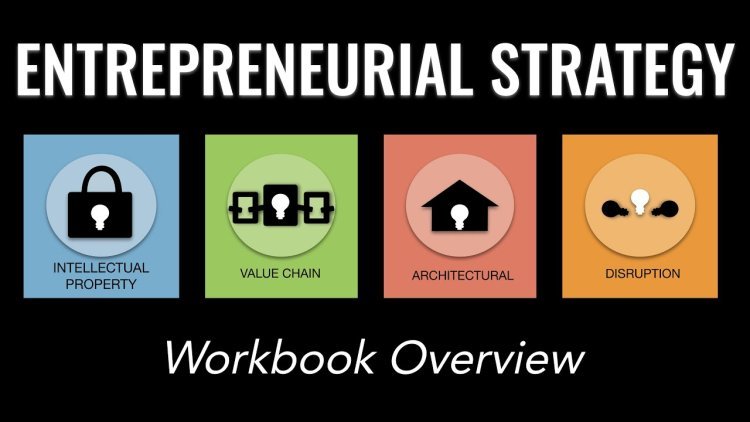Strategic Planning for Success: Entrepreneurial Lessons for Artists
Strategic planning is essential for achieving long-term success in any field, and the arts are no exception. Entrepreneurs excel at creating and executing strategic plans, which guide their ventures towards sustained growth and profitability. For artists, adopting these strategic planning practices can be a game-changer.

Strategic planning is essential for achieving long-term success in any field, and the arts are no exception. Entrepreneurs excel at creating and executing strategic plans, which guide their ventures towards sustained growth and profitability. For artists, adopting these strategic planning practices can be a game-changer. This article discusses strategic planning lessons that artists can learn from entrepreneurs to enhance their careers, including setting clear objectives, conducting SWOT analyses, creating actionable plans, monitoring progress, adapting strategies, and maintaining a long-term vision.
1. Setting Clear Objectives:
- Defining Goals: Entrepreneurs set clear, measurable objectives that provide direction and motivation. Artists should similarly define specific goals for their careers, such as releasing a certain number of albums, booking a specific number of tours, or achieving social media milestones. These goals should be SMART: Specific, Measurable, Achievable, Relevant, and Time-bound.
- Aligning with Vision: Goals should align with the artist’s overall vision and mission. Whether aiming to become a household name or focusing on a niche market, having clear objectives helps in making consistent and strategic decisions.
2. Conducting SWOT Analysis:
- Assessing Strengths and Weaknesses: A SWOT analysis helps entrepreneurs understand their strengths and weaknesses. Artists can use this tool to assess their skills, resources, and areas for improvement. Recognizing one’s strengths, such as a unique vocal style or strong stage presence, and weaknesses, such as limited marketing knowledge, is the first step towards strategic planning.
- Identifying Opportunities and Threats: Beyond internal factors, artists should also identify external opportunities and threats. Opportunities might include emerging music trends, new platforms for distribution, or potential collaborations. Threats could be market saturation, changing consumer preferences, or new competitors.
3. Creating Action Plans:
- Detailed Roadmaps: Entrepreneurs develop detailed action plans to achieve their objectives. Artists should create step-by-step plans that outline the tasks, timelines, and resources needed to reach their goals. This could include production schedules, marketing campaigns, or tour planning.
- Resource Allocation: Efficient use of resources is crucial. Artists need to allocate their time, money, and effort wisely, focusing on activities that offer the highest return on investment. This might mean prioritizing studio time, investing in high-quality promotional materials, or hiring a professional manager.
4. Monitoring Progress:
- Tracking Milestones: Entrepreneurs regularly monitor their progress to ensure they are on track. Artists should set milestones and regularly review their achievements against their goals. This might involve tracking social media growth, sales numbers, or audience engagement at performances.
- Adjusting Tactics: Regular monitoring allows for timely adjustments. If an artist’s social media strategy isn’t yielding results, they can tweak their approach, perhaps by trying different content types or platforms.
5. Adapting Strategies:
- Flexibility and Adaptability: Entrepreneurs adapt their strategies based on results and changing circumstances. Artists should be flexible and willing to change their plans in response to new information and experiences. For example, if a particular song style gains unexpected popularity, they might consider creating more music in that genre.
- Learning from Feedback: Constructive feedback from fans, peers, and industry professionals is invaluable. Artists should actively seek and incorporate feedback to refine their strategies and improve their work.
6. Long-Term Vision:
- Balancing Short-term and Long-term Goals: Entrepreneurs maintain a long-term vision while focusing on short-term goals. Artists should keep their long-term aspirations in mind, ensuring their actions align with their ultimate career objectives. This vision acts as a compass, guiding day-to-day decisions and long-term planning.
- Sustainable Growth: Focusing on sustainable growth rather than immediate success can lead to a more stable and enduring career. Artists should aim to build a loyal fanbase, develop a consistent body of work, and create a strong brand identity.
By adopting strategic planning practices from entrepreneurs, artists can achieve greater focus, efficiency, and success. Setting clear objectives, conducting SWOT analyses, creating detailed action plans, and maintaining a long-term vision are crucial steps for strategic planning in the arts. These practices enable artists to navigate their careers with purpose and direction, ensuring that they make the most of their talents and opportunities.
What are your career goals as an artist? Share your strategic planning tips in the comments! Your insights could help fellow artists chart their paths to success.
What's Your Reaction?










![Blog Submission Sites 2024 [High DA]](https://blognow.co.in/uploads/images/202306/image_100x75_6494a03eaff5e.jpg)
![Article Submission Sites 2023 [High DA & PA]](https://blognow.co.in/uploads/images/202307/image_100x75_64c4181f17036.jpg)
![Classified Submission Sites 2023 [High DA & PR]](https://blognow.co.in/uploads/images/202306/image_100x75_649dcd5260808.jpg)




![Article Submission Sites 2023 [High DA & PA]](https://blognow.co.in/uploads/images/202307/image_750x415_64c4181f08ed5.jpg)
![Classified Submission Sites 2023 [High DA & PR]](https://blognow.co.in/uploads/images/202306/image_750x415_649dcd5247eeb.jpg)
![Blog Submission Sites 2024 [High DA]](https://blognow.co.in/uploads/images/202306/image_750x415_6494a03e96bfa.jpg)
